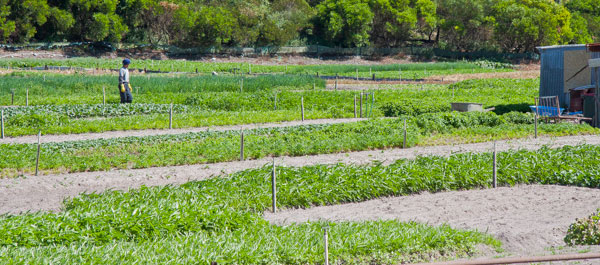Story and photos by Russ Grayson, June 2015
IN HER ARTICLE on the website of the Australian Food Sovereignty Alliance, following the ABC TV 4 Corners revelations of 417 visa holders being exploited by unscrupulous labour hire companies and farmers, Tammi Jonas, herself a farmer, calls for a reform of the foodchain to end the degrading conditions that the working visa holders are exploited under.
This is exactly what is needed. And as Tammi writes, Australia’s supermarket duopoly is implicated as guilty parties in this unAustralian exploitation of labour.
The Buckminster Fuller quote Tammi cites — about building a new system to replace the existing rather than just merely opposing it — is what fair food farmers, innovative food distributors like Brisbane Food Connect and Sydney’s Ooooby, and urban eaters enacting their free choice of food product are doing.
All of the systems reform Tammi calls for is clearly necessary — as is a government inquiry of some sort. But because these take time, exploitation could well continue in the meantime. Logically and morally it must be stopped and doing that calls for immediate and assertive action.
Disrupt, then replace
As Bucky said all those decades ago, when you want to change a system you need to invent a new model that will replace it. Often, the genes of the new are present in the body of the old — they are the ideas, the social movements, the fair food networks that start life on the innovative edge, the social fringe, and move towards the middle where they give expression to the new systems that grows out of the old.
The program shone its bright, glaring light into the rotting, dark corners of labour market brokers and exploitative farmers. Disruption is under way but it needs to build impetus to continue and to push towards a better system, and supporting that is a fitting role for the fair food movement…
When we are dealing with something like the exploitation of visa labour by unethical labour hire companies and the farmers they serve, those farmers aware of the labour companies’ methods, change can be stimulated by disturbing the equilibrium of the system you wish to replace. You make its life uncomfortable, you shine a bright light into its darkest, hidden corners. You disrupt it.
The 4 Corners program started this and has demonstrated the great value of investigative journalism to a democracy. The program shone its bright, glaring light into the rotting, dark corners of labour market brokers and exploitative farmers. Disruption is under way but it needs to build impetus to continue and to push towards a better system, and supporting that is a fitting role for the fair food movement. Just as we clear a garden to disrupt it in readiness for the next crop, so we can disrupt corrupt farm labour market practices to trigger the process of change that leads to a better model, a model that is new and fair.
That disruption is an effective tactic for reform was demonstrated in the weeks after the 4 Corners program when online grocery delivery service, Aussie Farmers Direct, dumped one of its chicken suppliers although, according to the Weekly Times, it is retaining another chicken supplier implicated in the labour market scandal. The National Farmers Federation made a public statement saying that mistreating workers has no place on Australian farms. The Federation said that unscrupulour labour hire companies need to be tracked and scrutinised.
This disruption works best when it is immediate and continuous, and would ideally include forcing the exploitative labour hire companies and complicit farmers either into reform and transparency or out of business, and prosecuting them where guilty. This would disturb and disrupt the business and that, to my thinking, would be a good thing. It would create opportunity for those engaging in ethical labor relations and restore a good reputation to their industry.
Were it to be applied, pressure from fair food advocates would further destabilise a system that is based on what 4 Corners described as slave-like conditions. Doing this would seed the growth of a fairer system, just as vacant niches in an ecosystem are soon claimed by new, fitter species.
Smith said that government intervention is sometimes necessary: “especially when the object is to reduce poverty… When the regulation, therefore, is in support of the workman, it is always just and equitable…”
Betraying the fair food market
Family farmers, small and especially innovative food distributors and the nation’s eaters are best served not by the quasi-monopoly of a grocery market controlled by the supermarket duopoly and its unscrupulous fellow travellers that engage in the alleged slave-like farm labour practices, but by a freed market. An open market, that is, freed from monopoly domination and unnecessary elements of government regulation, a market system open to all, a market where prices are set through the marketplace negotiation between producers and consumers — a relationship in which neither is the price setter.
Open markets were something championed by economic philosopher, Adam Smith. Despite being co-opted and misrepresented by apologists for the corporate market system, Smith said that government intervention is sometimes necessary: “especially when the object is to reduce poverty… When the regulation, therefore, is in support of the workman, it is always just and equitable; but it is sometimes otherwise when in favour of the masters.”
Smith’s words are relevant in the case of the 417 visa exploitation scandal.
I don’t know how we heed Smith to create a system where markets, working conditions and human opportunity coexist without a degrading exploitation, however I do know that forcing people to work in slave-like conditions is unAustralian and degrades the nation’s reputation. It betrays a fair market system and human rights. The time to disrupt and replace it is now.
[button_link url=”https://afsa.org.au/blog/2015/05/08/system-change-needed/” target=”” style=”blue” title=”” class=”” id=”” onclick=””]Read Tammi Jonas’ article[/button_link]





